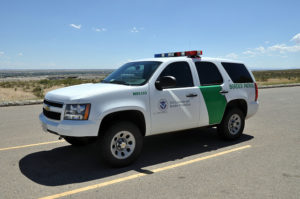This week, we’ve seen reports from the Cleveland area and New England about “immigration checkpoints” being used by Border Patrol and Immigration and Customs Enforcement to track down and detain suspected undocumented immigrants. What law gives Border Patrol the right to operate in areas that are not the border, and what rights does a person have to remain free from search or seizure as these checkpoints move to new areas?

Rights Against Search And Seizure Generally
In general, American law enforcement is restricted by the Fourth Amendment. This states that all people in the United States have the right to be free of unreasonable searches and unreasonable seizures.
Police cannot search your house, your person, or your car without a good reason. This reason needs to be shown to a judge to receive a warrant, unless there are special circumstances.
People are also free from unreasonable seizure. A police officer cannot just grab you and hold you without reason. An officer cannot take your property without a good reason.
Many people don’t realize that these basic truths about the legal system which we generally take for granted are weaker near the border.
The Border Zone, or “Constitution-Free” Zones
According to laws, regulations, and past court rulings, protections against search and seizure are lessened at the border. National security and immigration concerns about controlling who and what enter the United States are pointed to by those supporting this policy. Generally, even “routine” searches–those without reason or warrant–are allowed at the border. Now, how does this belief about the border being a special place get us to checkpoints in Ohio and New England?
In 1953, the Department of Justice put out regulations allowing the Border Patrol to operate within 100 miles of any US border. At first glance, this does not look extremely large, but consider that the entire states of Hawaii, Michigan, Florida, Massachusetts, Rhode Island, Delaware, Maine, and New Hampshire exist within this zone. In fact, a full two-thirds of the US population reside within this zone the Border Patrol is allowed to operate within.
This permission from the Department of Justice for Border Patrol to operate away from the border has led critics of the policy to refer to this 100-mile zone as a “Constitution-Free Zone”.
When operating away from an actual port of entry, there are some limits which regulations place on the power of the Border Patrol. They are supposed to only pull over and detain those they have “reasonable suspicion” of committing an immigration violation or crime. Border Patrol may also operate immigration checkpoints within this zone.
How Does This Work In Practice?
Just because the Border Patrol is only supposed to work within 100 miles of a boundary and only supposed to stop or detain those who commit crimes does not mean that this is always how it works.
There are reports of Border Patrol agents randomly stopping cars, even when no reason to do so exists.
There are reports of Border Patrol checkpoints appearing outside the 100 mile zone, including places like the California-Nevada border.
The Border Patrol is also claiming the authority to conduct unlimited and unwarranted searches of travelers’ electronic devices, leading to concerns about private data being collected by the Federal Government.
All in all, Border Patrol is not the most transparent agency about its operations, so it is difficult to answer where and in what ways they are operating at a given time.
What Does This Mean For Me?
With the new focus on immigration violations coming from the Trump Administration, it is likely that we will see more of these immigration checkpoints operating within the Border Zone. It is also possible, given support by US Circuit Courts, that the US will begin seeing some of these checkpoints outside the 100-mile zone.
Given what has been seen following recent ICE raids on workplaces, it is possible that US citizens will be caught up in these efforts to show zero tolerance on undocumented immigration.
If you feel that your rights have been violated during a stop, or at a checkpoint, it is important that you speak to an attorney as soon as possible.
Additional Information
The American Civil Liberties Union has been looking into what happens at the border and within the border zone.
Their Know Your Rights page has a sheet you can print so that you know, and more importantly can protect, your rights if you are stopped by Border Patrol agents.
Leave a Reply